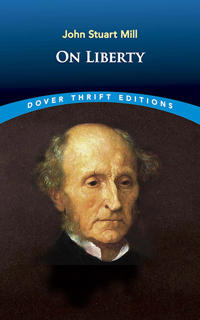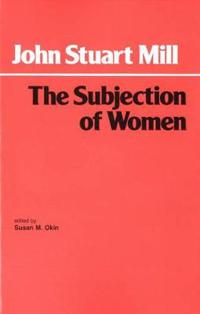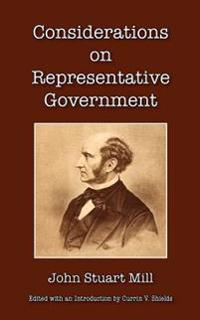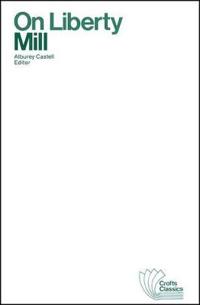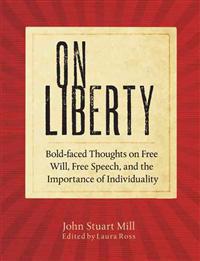History of Economic Theory: The Selected Essays of T.R. Malthus, David Ricardo, Frederic Bastiat, and John Stuart Mill (Häftad)
ISBN: 9780615817897 - UTGIVEN: 2013-05"utilitarianism" and "on liberty" - including mills essay on bentham and se (Pocket)
avJohn Stuart Mill
ISBN: 9780631233527 - UTGIVEN: 2002-12-12This book combines John Stuart Mill's key writings, "Utilitarianism," "On Liberty," and 'Essay on Bentham', with formative selections from Mill's greatest influences, Jeremy Bentham and John Austin, and a discerning introduction written by the renowned ethics scholar Mary Warnock. This combination p[...]
John Stuart Mill on Liberty and Control
ISBN: 9780691089881 - UTGIVEN: 2001-06John Stuart Mill is one of the hallowed figures of the liberal tradition, revered for his defense of liberal principles and expansive personal liberty. By examining Mill's arguments in On Liberty in light of his other writings, however, Joseph Hamburger reveals a Mill very different from the "saint [...]
On Liberty (Häftad)
avJohn Stuart Mill
ISBN: 9780760755006 - UTGIVEN: 201308Published in 1859, John Stuart Mill's "On Liberty" presented one of the most eloquent defenses of individual freedom in nineteenth-century social and political philosophy and is today perhaps the most widely-read liberal argument in support of the value of liberty. Mill's passionate advocacy of spon[...]
Collected Works of John Stuart Mill 2 Volume Set: A System of Logic, Ratiocinative and Inductive, Volume 7 and 8 (häftad)
ISBN: 9780865976924 - UTGIVEN: 2006-08Volumes 7 and 8 comprise Mill's landmark philosophical work "A System of Logic, Ratiocinative and Inductive, " in which Mill explores the basic principles of inductive reasoning. In this work Mill presents the five basic modes of induction, which are now known as Mill's Methods: the method of agreem[...]
Subjection of Women (Häftad)
avJohn Stuart Mill
ISBN: 9780872200548 - UTGIVEN: 198801Edited by Susan M.Okin.
Utilitarianism (Häftad)
avJohn Stuart Mill
ISBN: 9780872206052 - UTGIVEN: 200203This expanded edition of John Stuart Mill's 'Utilitarianism' includes the text of his 1868 speech to the British House of Commons defending the use of capital punishment in cases of aggravated murder. The speech is significant both because its topic remains timely and because its arguments illustrat[...]
The Classical Utilitarians (Häftad)
avJeremy Bentham, John Stuart Mill
ISBN: 9780872206496 - UTGIVEN: 200303This volume includes the complete texts of two of John Stuart Mill's most important works, UTILITARIANISM and ON LIBERTY, and selections from his other writings, including the complete text of his REMARKS ON BENTHAM'S PHILOSOPHY. The selection from Mill's A SYSTEM OF LOGIC is of special relevance to[...]
Considerations on Representative Government (Häftad)
avJohn Stuart Mill
ISBN: 9780877973669 - UTGIVEN: 2007-04Considerations on Representative Government (Pocket)
avJohn Stuart Mill
ISBN: 9780879756703 - UTGIVEN: 1991-05In this powerful work, John Stuart Mill sets forth representative government as the most sensible compromise between unreflective rule by the masses and the self-indulgence of the few. The reader of this volume senses that Mill is being pulled in opposing directions: steadfastly committed to majorit[...]
On liberty (Pocket)
avJohn Stuart Mill
ISBN: 9780882950563 - UTGIVEN: 1947-06This volume includes the complete essay in five chapters: Introductory; Of the Liberty of Thought and Discussion; Of Individuality, as One of the Elements of Well-being; Of the Limits to the Authority of Society over the Individual; and Applications. With a fine introduction by editor Alburey Castel[...]
James and John Stuart Mill
ISBN: 9780887387272 - UTGIVEN: 1988-11The story of James and John Stuart Mill is one of the great dramas of the 19thcentury. In the tense yet loving struggle of this extraordinarily influential father and son, we can see the genesis of evolution of Liberal ideas-about love, sex, and women, wealth and work, authority and rebellion-which [...]
On Socialism & the Subjection of Women (Inbunden)
avJohn Stuart Mill
ISBN: 9780979336324 - UTGIVEN: 2007-03John Stuart Mill
ISBN: 9781107407039 - UTGIVEN: 2012-08Nicholas Capaldi's biography of John Stuart Mill traces the ways in which Mill's many endeavours are related and explores the significance of Mill's contribution to metaphysics, epistemology, ethics, social and political philosophy, the philosophy of religion, and the philosophy of education. He sho[...]
A System of Logic, Ratiocinative and Inductive (Pocket)
avJohn Stuart Mill
ISBN: 9781108040891 - UTGIVEN: 2011-12This two-volume work, first published in 1843, was John Stuart Mill's first major book. It reinvented the modern study of logic and laid the foundations for his later work in the areas of political economy, women's rights and representative government. In clear, systematic prose, Mill (1806-73) dise[...]
Principles of Political Economy, with Some of Their Applications to Social Philosophy (Häftad)
avJohn Stuart Mill
ISBN: 9781230444857 - UTGIVEN: 2013-09On Liberty (Häftad)
avJohn Stuart Mill
ISBN: 9781402792274 - UTGIVEN: 201208"On Liberty", John Stuart Mill's classic critique of the ethical limits of governmental authority, remains one of the most influential philosophical treatises ever written. This interactive edition in our popular "Bold-Faced" series prompts readers to reflect on the importance of free will, free spe[...]
Utilitarianism (Häftad)
avJohn Stuart Mill
ISBN: 9781420925104 - UTGIVEN: 200501The philosophy of utilitarianism can trace its origins back thousands of years but it's most famously associated with the 18th century English philosopher Jeremy Bentham. The basic principle of utilitarianism is that ones actions should be guided towards outcomes that create the greatest good for th[...]

